Transcript of an interview with EdwinFrom the archives recorded on the former Palace FM (now Centre FM in Tamworth) in 1994Interviewer DJ Barry John -
Video stills with compliments of Steve Clarke
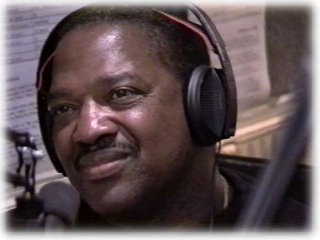
Where were you born and what sort of environment was your upbringing ?
I was born in Nashville, Tennessee, which is the home of country music as most people know, but I was influenced more to Rhythm and Blues as opposed to Country and Western, although I've always enjoyed Country & Western, in fact I enjoy it even more so now probably due to the fact that as well as being a performer I'm a writer and I like the simplicity of the way that country music is written, the story lines are very, very down to earth.
Was it difficult as an R&B enthusiast to make waves in Nashville and to progress and be successful ?
No, I left Nashville at a very, very early age, I was raised and had my “formidable” education in Ohio in Cleveland and Cleveland, for the most part, was the hub of music at that point during the 50s and 60s. At one point if you didn't play in Cleveland you couldn't consider yourself to be a major mainstream artist because that's how influential it was in the different areas as far as nightclubs and theaters were concerned.
Do you have any brothers and sisters ?
Yes I got a brother named Angelo who is here with me he is also the leader of my band and I've got another brother named Terry who's in Las Vegas and a sister named Patti
What was the earliest influence on you musically?
I grew up in a house where music was a force to be reckoned with. My mother enjoyed music greatly and I listened to at a very, very early age I got a chance to hear some of the songs that most people heard that were cover versions like the original ‘You Ain't Nothing But A Hound Dog' by Big Mama Thornton that he writ that was eventually done by Elvis Presley and all of the original songs that were eventually covered in later years by people like Pat Boone, people like that. I got a chance to hear them because at one point music was all Rock & Roll and that was the era that I grew up through, the era when it was just considered to be rock & roll.
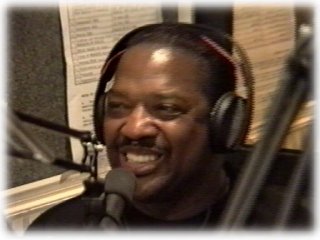
What was your first label?
The very first label I can't even recall what is was called. I had a group called the Future-Tones and we recorded one song on a label as a by-product of a contest that we won – that was Tress records – and that in itself, that particular song, if you could find an original copy would be worth a great deal of money.
Your early recordings were with Ric-Tic.
Ric-Tic was a spin off from Golden World, cos the very first hit that Golden World had was “Just Like Romeo & Juliet” by the Reflections and then they went on to have things like The Parliaments, JJ Barnes, Funkadelics, Al Kent.
Although you've recorded for other labels many fans may regard you as a Motown act. Are you proud of having worked with Motown. ?
Anyone who has been affiliated with Motown at any time has to feel proud about the association because probably one of the most prolific labels of any time was Motown, so to be part of the Motown legacy was most definitely something to be proud of.
How did you become associated with Motown ?
What happened is that I was in England on one of the many occasions that I was here doing a tour and I went back to the United States to co-star at the Apollo theater with the Temptations and one of the Temptations informed me that I had been signed with Motown and I didn't think that that was possible because no-one had told me and what happened is that Motown bought the company that I was with which was Golden World and because of that I became instantly a Motown artist.
What was your first Motown recording ?
The very first one was a song called “I Am The Man For You Baby” which was produced by Johnny Bristol. He was a very, very prolific writer, very, very strong as a writer.
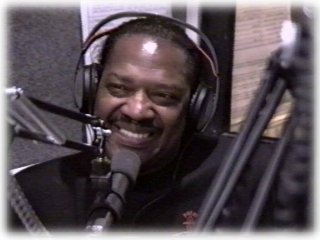
What do think of Palace FM ?
It's great, I like it. The concept is very, very good.
Tell me about your appearances in the soul mag' Blues & Soul ?
In the history of Blues & Soul I think I've had 3 covers. From the very first Blues & Soul in '67 to this one in '74 and I had a recent one in the ‘80s.
Tell me about the two soundtracks you are credited with, “Hell Up In Harlem” and “Run Man Run” ?
Well, actually I didn't write the scores. The writers were Phil Perrin and the gentleman responsible for the very, very big record by Gloria Gaynor's “I Will Survive”. They were the ones who actually did the score, I did all the singing as far as the scores were concerned. The other one was a very short pre-video promo that Motown made for one of the songs that I did with a young lady named Blinky and it was video before videos were even thought of being made.
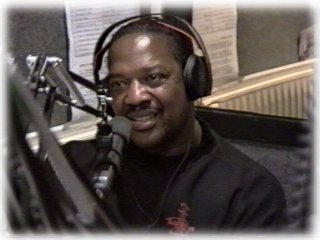
How successful have you been in America over the years tempered with your success in the UK ?
Possibly on par. I was very, very lucky. I came up through a wonderful musical era in the United States, I played with some of the biggest artists that you could think of. I was fortunate to share stages with Otis Redding, Steppenwolf … you name ‘em… Jackie Wilson, I was on stage with a lot of people… Wilson Pickett… because during the time that I came up it was not unheard of for there to be a tour, given by a gentleman named Henry Wynn, and these tours were comprised of like, maybe seven to eight major acts. I've done shows where there's been myself, BB King, Bobby Blue Bland, Aretha Franklin, Gladys Knight & The Pips and Wilson Pickett all on the same show. And there was no such thing as ‘who was the star ?' it didn't go like that. The promoter was giving the best value for their money.
Has you opinion of Motown changed over time ?
It's very difficult for you to be opinionated about something you don't know about. I knew about the times when I was with Motown and those were good memories. If there's anything that has changed in the interim it has nothing to do with me or the memories that I have so I wouldn't really be an expert on saying what's good or what's bad.
What was the reason for changing labels from Motown ?
Purely creative. It was along during the same time that the Isley Brothers, The Jacksons, a lot of people left and it was only purely and simply because we all wanted to be a little bit more in control.
Do you think Motown's restrictions on artist creativity were justified ?
Probably so because if you've got in-house prolifically probably the strongest team of writers and producers that the world has ever seen with Holland Dozier Holland, Mickey Stevenson, and you know you've got Stevie Wonder, Harvey Fuqua and Johnny Bristol. I mean you got writers that write hits like most people drink water, you know, you've got a platform for you to say ‘Yes, we got our own writers and we've got our own producers so your material - not to say that your material's not good - but we've got a proven formula.'
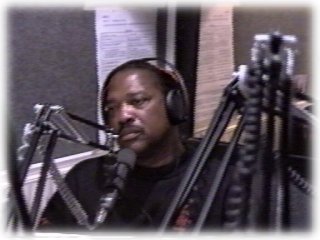
Do you have a favourite memory of Motown ?
Possibly my favourite memory of Motown was when I got a chance to…the very, very first tour, I got a chance to do with Marvin Gaye, that was probably my fondest memory because I got a chance to do something that most people never got a chance to do and that was to sit and talk with him. Because he was such an introvert, an introverted kind of person it was very hard to find out who the man really was and we struck up a really really good friendship and consequently I did three other tours with him.
Do you have a favourite Motown recording ?
I think that my favourite Motown recording had to be song by Ivory Jo Hunter, “I Remember When” , which was the absolute great song. I doubt very much if it was played over here.
My favourite group is the Four Tops, I love all of the stuff that they done. I just did a major tour with them, the Tops, myself, Temptations, Martha Reeves & The Vandellas and Jimmy Ruffin.
Are you an accomplished musician as well as a singer ?
I do very, very little as far as the way of actually playing any instruments but I can hear very, very well if that's understandable. I could formulate an arrangement completely in my mind and luckily I've got ten great musicians that work with me all the time and I can, I'm the best ‘dum-de-dumder' in the business and they can relate to what I'm trying to say to ‘em you know, so I wind up being able to ‘dum-de-dum' into most of my records.
Tell me about Stevie Wonder ?
Stevie was great man. When I first met Stevie it was during the time when he was still called Little Stevie Wonder, in fact he's been here to my house in Polesworth. Stevie and I are very, very good friends for a long time, for a lot of reasons, but most of all he's a really very personable guy.
What were you doing during the eight years between Motown and your reappearance with 20th Century's Contact ?
That was during the time that I was finally reaping the benefits of War because when War was initially put out it was a touchy song that it was a very hard situation to work because of the lyric content of the song War. But as the song grew in popularity so did the relaxed attitude of the people saying “well you know that's anti-American” . They kind of took it on to it being exactly what it was. It was not anti- anything it was just simply saying we're in a fruitless situation and it needs to come to an end. So during that time I was working doing concerts, primarily college because the college students were very much into the anti-war thing.
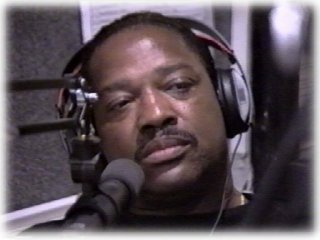
Was it necessary to feel the sentiments of the song War, in order to sing it ?
It was necessary to understand and appreciate the lyrics. I was given the opportunity to record the song but I made the stipulation that I must record it with the feeling that I thought was right for it and I was given that privilege to do so.
There is obviously life after Motown for many artists, with yourself a prime example. Are there many others who simply slipped into obscurity?
Unfortunately there's a lot that have slipped into obscurity but through no fault of their own. Primarily what happens with artists is that record companies get an idea in their head that because an artist has been around for a while, or has what we consider in the business a ‘track record', that they are too old to be valid as far as their artistry is concerned which is a fallacy, I mean, some of the best artists in the world are older artists but record companies have this tendency, for the lack of a better word they have this tendency to ‘prey' on the young and vulnerable, you know - as opposed to someone who knows what the whole deal is and is maybe not as excited to sign - they wind up signing away their life, you know, such as the situation we've just seen happen recently with George Michael and Sony.
How much of a landmark was the decision in the Sony/George Michael case. Will the artiste or the record company benefit ?
The artist won't benefit at all. What will happen is that the record companies now - not that they have never done it before – what they will do now it will be a ‘take it or leave it situation' it'll be you take what we offer you or go and find some other place to be. Somebody else'll take it and you know, that's what they deal with and if you notice, the artistes that they're utilising are younger and younger and younger and it's almost gonna be necessary to invoke the Coogan Law so that some of these younger artistes can be protected.
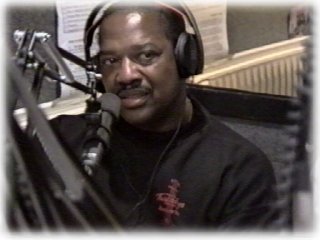
What is the Coogan Law?
Jackie Coogan was a actor in the United States, was a kid, child actor and made a very, very great deal of money in a very, very short span as a kid. But because he was a kid the contractual situation was not as valid as it would be for an adult, up to a certain age. The law had to be changed because he was being ripped off left, right and centre because he was so young that he was signing as an adult but not being dealt with as an adult.
Has your musical career been as rewarding as you as you would have wished it have been ?
Absolutely, and it's even more rewarding now than it has ever been in the history of the time that I've been in the business. I'm busier now than I've ever been, I'm playing for wider and bigger audiences. I've just come back from Austria doing a three day concert there and it's just wonderful, it really is.
What is you connection with Germany ?
My manager is German, Lilian's been my manager for twenty years which is also a very strong point in the business because most artistes change and chop managers like they change and chop suits or shoes but she's been very, very good for me. Lilian's credibility and background is that she was Mike Jeffries right hand and Mike Jeffries was the gentleman who managed Jimi Hendrix, the Small Faces and the Who at one point.
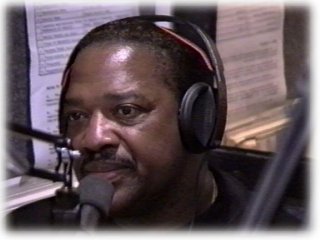
You're using German studios for this latest release, is that usual for you ?
I utilise the studios wherever. If I happen to be in France and I feel like I wanna record I'll find the nearest recording studio there, you know. If I'm in England or Germany or wherever I happen to be, if I feel the need to record there's a recording facility everywhere.
In fact one of my fondest memories of recording was in Wales. I recorded at a studio in Wales because the band that was with me at that time was a band that I discovered, Rose Royce.
Tell me about ‘Contact'
When the song was written Lilian had asked me on several occasions to do a disco song but I just couldn't get my head around two minutes of lyrics and fifteen minutes of music so what I did, I wrote the obvious. I said to myself people go to discos to meet people and how is the first way you meet someone and that's through eye contact so I wrote the story around that.
Tell me about HAPPY Radio ?
Night clubs and radio in the United States were having a real battle with each other
when I put this together and I was trying to figure out how to bridge the gap, how to get the best out of radio as well as getting a record played, you know, in the clubs.
If you had a chance to do it all over again would you do anything different. Is there anything particular that you wish you hadn't done the way you done it ?
No, not a thing, absolutely nothing and that takes no thought at all. I've never done anything in my entire career or in my personal life that I'm ashamed of. I've tried to do one thing all my life and that was ‘be a good person' and that's more important than an artiste, performer or singer or any of that. That's the one thing I like about here, being in Polesworth or in Tamworth. When I walk around through town I'm just a local, I'm just another person that's walking in the town and that's great.
Why are you known as being able to put on a show even regardless of technical failures?
Being a product of when there was no razzle-dazzle and all you had was your raw ability, that's what I remember. Even now, if the microphone broke and the lights went out and the stage collapsed I still got to do the show because the people don't want excuses they want a show.
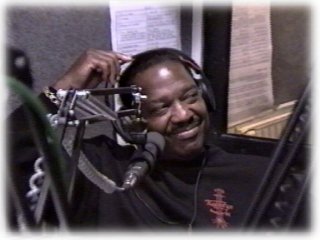
Is there any ambition you have yet to fulfil ?
Oh loads of things. One of the things that I'd like to fulfil most of all is that, at the moment I'm involved with some young people in Tamworth and in Polesworth and a young gentleman named David that I'm doing some work with and, one thing I'd like to see is I'd like to see a couple of resident local acts get a chance, get something happen and get into the big time. I'd love to see that happen and be somehow responsible for getting them through the appropriate doors.
Although you are regarded as a soul legend, you often get involved with the local community.
I don't think of myself as a soul legend. I am an artist who is very, very fortunate to still have a career 28 years later.
You've always had a deep affinity to England too.
Yeah, I was gonna live here no matter what.
Is there any particular aspect of Britain that appeals to you ?
Everything…everything about being here. If you lived in the United States for any length of time, I'd say hypothetically five years, you'd understand exactly what I'm talking about. You have not yet – and let's hope that you never will – reach the status where you have to look over your shoulder all the time. And you've heard the expression ‘living on the edge' well in the States you live ‘on the edge' all the time and I don't find that's a necessary factor here. I mean, two weeks ago, I spent the whole day with the West Midlands Constabulary, you know, with the police of the West Midlands now in the States I couldn't spend ten minutes with the police unless they were going to arrest me for something.
If we came back to your home right now what music would we find on the record player ?
You might hear anything, Meatloaf, Led Zeppelin, Chicago, Alice Cooper, you might hear anything in my house.
Your most treasured possession ?
At the moment my Maserati.
What's so special about the Maserati ?
That it's mine (laughing), I've got an obsession about cars.
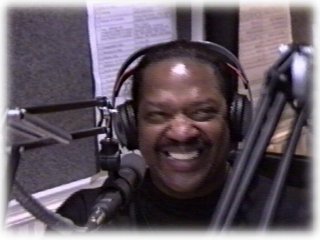
Do you have any hobbies or pastimes
Cars, cars and I absolutely love horseback riding but I don't get a chance to do it, you know, I mean, when I was with Motown that was one of the things that we did all the time, all the artists got together and we used to go to Windsor, Ontario, and we all had horses and we would go horseback riding at a place called Totem Pole but unfortunately I don't have the time to do it here although I would like to. The only problem here is I'd have to learn to ride all over again because I've never ridden English saddle, I've always ridden western saddle which is a completely different kind of saddle.
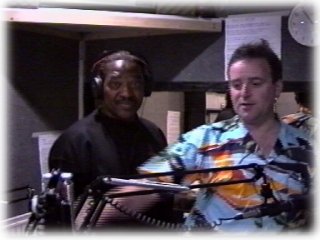 Thanks for your visit to PalaceFM
Thanks for your visit to PalaceFM
It's a pleasure
|
